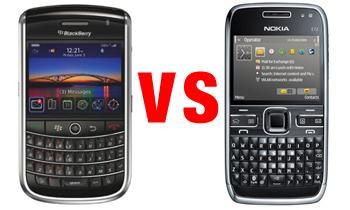The press conference yesterday between the Redmond, WA software maker and Finnish handheld manufacturer marked an unholy matrimony meant to bring Office and a suite of collaboration and communications tools to Nokia's business E-Series smartphones. The interesting part to note is that Microsoft and Nokia explicitly stated that the alliance was created to thwart off Research in Motion's domination in the corporate sector, with Nokia's VP stating "This is really about creating a formidable challenge for RIM rather than anyone else." If Office is truly the last frontier on the mobile space, then the statement made by Nokia's VP shows that both firms miss the underlying business complexities of the industry that they're in and will continue to bury themselves deeper with an exodus of users fleeing to other platforms, including BlackBerry.
Read on to learn more about our analysis.
Phone sales are only a part of the equation, and a small part at best. Arguably, analysts have stated before that Windows Mobile licenses only represent a small portion of Microsoft's revenues. Windows Mobile—with its relatively lower adoption cost compared to servers and other corporate hardware, familiar Windows UI, and native Office applications—is a bid by Redmond to bait and lure corporate IT executives to purchase more expensive Microsoft software and hardware, primarily that of Exchange and to license Exchange ActiveSync (EAS) for push emails.
Analysis: In the same reasoning, it could also be argued, though to a lesser extent, that Research in Motion's operating model is centered around more expensive BlackBerry servers housed at its National Operations Center (NOC), its BlackBerry Enterprise Server (BES) licenses for corporate users, and its BlackBerry Internet Service (BIS) agreements with carriers for personal users. This is similar to Microsoft's strategy, and places actual BlackBerry handhelds as a smaller fraction of RIM's business model.
While targeting Nokia E-Series smartphones and Windows Phone as being more "complete" with official versions of Office from Microsoft rather than third parties may (emphasis on may ) increase Windows Mobile and Nokia handset sales, it really doesn't diminish RIM's influence on the corporate world. Additionally, an Office project for Nokia may be futile as there are already a number of third-party Office apps available that provide similar functionality. Even so, while businesses may choose to purchase phone models from Microsoft's partners and from Nokia, IT executives could still choose to purchase the more lucrative and expensive server hardware and software licenses from Research in Motion.
RIM's Fightback: Research in Motion's answer to the challenge is the announced, but not yet materialized BlackBerry Application Suite, which is basically running RIM's BlackBerry OS in a virtualization environment on Windows Mobile hardware. BlackBerry Applications Suite will allow RIM to be competitive in the event that their customers choose Windows Mobile or Nokia phones since the company can still make money on back-end server-side technologies. Unlike BlackBerry Connect, which is more limited, BlackBerry Application Suite will run a significant majority—if not all—of RIM's OS on Windows Mobile phones as if a user was natively using a BlackBerry handheld.
Moreover, although BlackBerry, Android, iPhone, and webOS do not have native Microsoft Office support—and even Nokia devices yet—those platforms already have a few third-party offerings that offer competitive features, including Documents to Go (also available on select Windows Phones and QuickOffice.
Conclusion: Essentially, what Nokia and Microsoft is doing is creating a resource-intensive partnership, pulling intellectual and human resources away from efforts and projects that could potentially strengthen their respective platforms on Symbian and Windows Mobile. I'd like to see Microsoft develop Windows Mobile 7 and release it sooner with features that are compelling enough against the Pre and the iPhone and will surely beat BlackBerry, both on the front-end (phone) and back-end (server-side).
Multi-touch support, porting Internet Explorer on the Zune to Windows Mobile, and creating synergies between Windows, Office, the Xbox, Zune, and other units are but some of the few features that I personally hope to see. As it stands, Nokia's presence seems more of a distraction than a partnership, and Microsoft already has plenty to do on its plate with its own Windows Mobile platform. Having not introduced any of these features, it's easier for Microsoft to focus on a partnership that may ward off the competition rather than admit defeat.
What do you think? Is this partnership a cover-up for failing to capture the hearts of smartphone users and the smartphone business or will this really create a dynamic duo that RIM should be trembling about?

